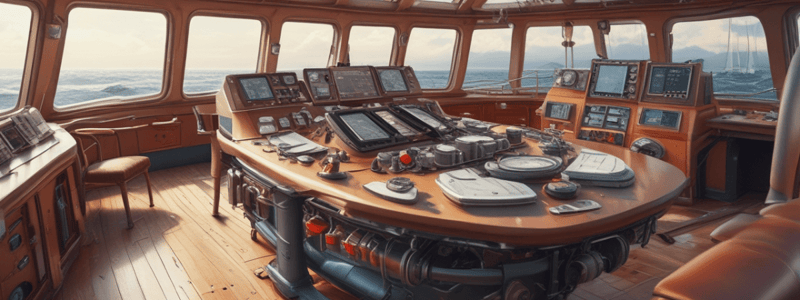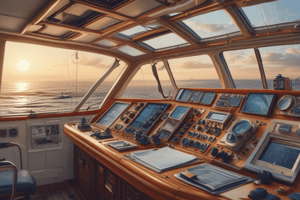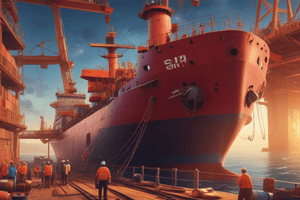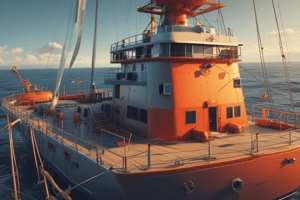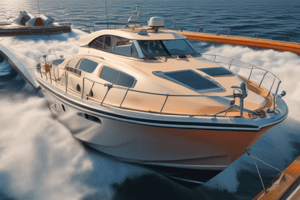Podcast
Questions and Answers
State the objectives of the International Safety Management code.
State the objectives of the International Safety Management code.
To ensure safety at sea, prevent human injury or loss of life, and avoid damage to the environment.
State how the objectives of the ISM code are achieved.
State how the objectives of the ISM code are achieved.
The objectives are achieved through the implementation of a safety management system, assigning responsibilities, conducting risk assessments, and ensuring compliance.
State the minimum size of vessel required to comply with the ISM code.
State the minimum size of vessel required to comply with the ISM code.
500 gross tonnage or above.
With reference to planning a voyage, state the factors which should be considered regarding fuel.
With reference to planning a voyage, state the factors which should be considered regarding fuel.
With reference to planning a voyage, state the factors which should be considered regarding lubricating oil.
With reference to planning a voyage, state the factors which should be considered regarding lubricating oil.
With reference to planning a voyage, state the factors which should be considered regarding fresh water.
With reference to planning a voyage, state the factors which should be considered regarding fresh water.
List THREE complementary techniques used to manage garbage according to Annex V of the MARPOL convention.
List THREE complementary techniques used to manage garbage according to Annex V of the MARPOL convention.
What information must be entered in the Garbage Record Book when garbage is discharged into the sea?
What information must be entered in the Garbage Record Book when garbage is discharged into the sea?
In which area must no garbage whatsoever be disposed of overboard?
In which area must no garbage whatsoever be disposed of overboard?
State a form of garbage that is prohibited from disposal into the sea.
State a form of garbage that is prohibited from disposal into the sea.
State THREE possible consequences of water contamination of marine diesel oil during bunkering.
State THREE possible consequences of water contamination of marine diesel oil during bunkering.
State THREE sources of contamination of fuel by water on board a vessel.
State THREE sources of contamination of fuel by water on board a vessel.
Study Notes
Objectives of the International Safety Management (ISM) Code
- Enhance maritime safety and prevent pollution from ships.
- Establish a safety management system that promotes environmental protection.
- Ensure that all vessels operate in compliance with legal and regulatory requirements.
Achieving ISM Code Objectives
- Implementation of a Safety Management System (SMS) on board each ship.
- Regular audits and evaluations to monitor compliance and effectiveness of the SMS.
- Continuous training and education of crew members in safety practices and pollution prevention.
Minimum Vessel Size for ISM Compliance
- The ISM Code applies to all passenger ships and cargo ships of 500 gross tonnage or more.
Voyage Planning: Fuel Considerations
- Assess fuel type and quality to ensure compatibility with engine requirements.
- Calculate fuel consumption based on the planned route and vessel performance.
- Account for fuel availability in ports along the route, including contingency planning for delays.
Voyage Planning: Lubricating Oil Considerations
- Determine the correct type and grade of lubricating oil for engines and machinery.
- Monitor consumption rates to ensure sufficient supply during the voyage.
- Plan for proper disposal of used lubricating oil in compliance with MARPOL regulations.
Voyage Planning: Fresh Water Considerations
- Calculate fresh water needs for crew, sanitation, and machinery cooling.
- Evaluate options for fresh water sourcing at ports along the route.
- Consider the impact of fresh water usage on ballast conditions and vessel stability.
MARPOL Annex V: Garbage Management Techniques
- Segregation of waste types to facilitate proper disposal.
- Use of onboard compaction and processing systems to reduce waste volume.
- Establishment of a waste management plan that complies with MARPOL requirements.
Garbage Record Book Requirements
- Date and time of garbage discharge.
- Type of garbage disposed of and the method of disposal (e.g., incineration, discharge, recycling).
- Quantity of garbage disposed of to ensure compliance with MARPOL regulations.
No Garbage Disposal Area
- Disposal of any garbage is prohibited in marine protected areas and special areas as designated under MARPOL.
Prohibited Garbage Disposal
- Plastics are completely banned from being disposed of into the sea.
Consequences of Marine Diesel Oil Water Contamination
- Loss of propulsion or power due to fuel system malfunction.
- Increased maintenance costs and downtime for engine repairs.
- Potential environmental pollution and regulatory fines.
Sources of Fuel Contamination by Water
- Inadequate fuel tank management leading to water accumulation.
- Poor bunkering practices, including contaminated transfer equipment.
- Rainwater intrusion through unsecured openings or ventilation systems on the vessel.
Studying That Suits You
Use AI to generate personalized quizzes and flashcards to suit your learning preferences.
Description
Prepare for the Small Vessel Second Engineer certification exam administered by the Scottish Qualifications Authority. This quiz covers operational procedures, basic hotel services, and ship construction. Get ready to demonstrate your knowledge on Friday, 02 November 2018, from 1400 to 1600 hrs.
